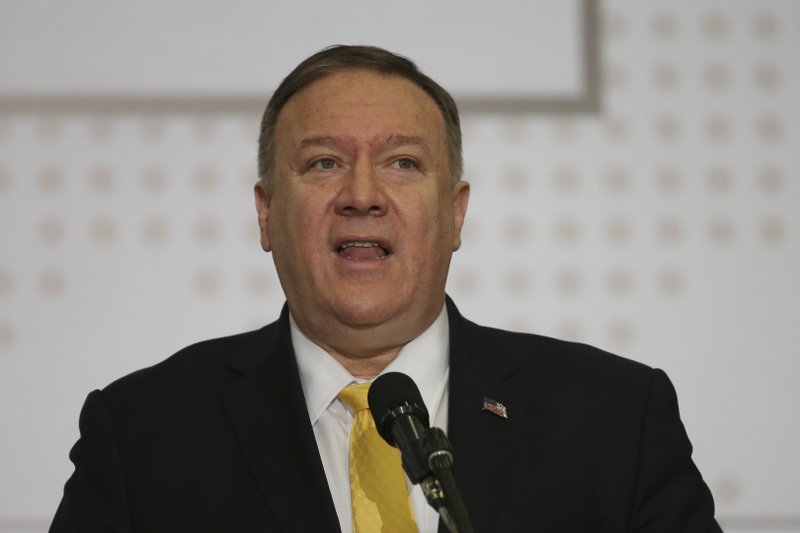BOGOTA, Colombia -- Venezuelan opposition leader Juan Guaido joined officials from the United States and Latin America in condemning Venezuelan President Nicolas Maduro as a promoter of terrorism.
The man recognized by the U.S. and nearly 60 other nations as Venezuela's rightful leader got a red-carpet welcome to Colombia on Monday and stood prominently beside world heavyweights, including U.S. Secretary of State Mike Pompeo, who gathered for an international conference to discuss regional cooperation against terrorism. Guaido was trying to buoy international support for his flagging movement.
"We are honored by your presence," President Ivan Duque told Guaido. "You will always have a friend in Colombia."
The stately reception stood in stark relief to Guaido's recent tussles with national guardsmen blocking his entrance to the National Assembly in Venezuela, the latest chapter in the country's ongoing power struggle.
This week will mark one year since Guaido stood before densely packed crowds of cheering Venezuelans and proclaimed himself the nation's legitimate president, launching a bid to unseat Maduro that has thus far proved unsuccessful.
"There's a big contrast over the international recognition and support Guaido has in the diplomatic arena, and how that translates into concrete actions back in Venezuela," said Diego Moya Ocampos, a political risk analyst.
[Gallery not loading above? Click here for more photos » arkansasonline.com/121guaido/]
Leaving Venezuela is a risky move for the opposition leader, whom the pro-Maduro Supreme Court has barred from leaving the nation. Guaido has only traveled outside Venezuela one other time in the past year, sneaking across the border into Colombia to oversee a failed bid at bringing in humanitarian aid in February 2019. He returned on a commercial flight and was allowed back into Venezuela.
It's unknown whether authorities will let him back again this time. He will go on to Europe after leaving Colombia today.
"That risk always exists in Venezuela," Guaido said to journalists as he headed into a meeting with Pompeo.
The decision to travel underscores the limited options Guaido is currently facing. Though he encouraged supporters to take to the streets after dozens of national guardsmen blocked him and other lawmakers from entering the National Assembly, there have been no major demonstrations. His push to oust Maduro now relies more heavily on international pressure.
He used the Colombia meeting to highlight links between Maduro's government and armed actors like Lebanese militia group Hezbollah and Colombian rebels accused of operating within Venezuela.
"After today's event, I think the world has it very clear that there is a dictatorship that finances terrorism," Guaido said.
Pompeo shook hands warmly with Guaido, and together with other dignitaries laid a wreath of white roses in homage to 22 police cadets killed in a bombing last year at the General Santander Police Academy, where the meeting took place. In a speech, he blasted Maduro as an ally to terrorist groups that in contrast to other nations in Latin America is providing "a home" to Hezbollah.
"This is unacceptable," he said.
Asked whether the U.S. is considering placing Venezuela on the state sponsors of terrorism list, Pompeo said only that Trump administration officials are "constantly evaluating" which nations should be included.
Moya Ocampos said he anticipates that the gathering will raise awareness of the established links between Venezuela and Hezbollah in generating illicit revenues and money laundering. But short of additional sanctions, it was unclear what other actions the coalition of nations might take.
Thus far, Maduro's government has managed to stealthily evade punishing U.S. sanctions by accessing black markets and boosting cash revenue from alternative sources like gold.
"I think they've managed to successfully adapt to the existing sanctions," Moya Ocampos said. "They've proven to be very resilient."
Maduro allies including Diosdado Cabello, head of the powerful National Constitutional Assembly, brushed off Guaido's international tour, dismissing the Bogota event as "a conference of terrorists."
"It doesn't occupy any of our time," he said, "because in truth, it's insignificant."
Duque -- whose nation has taken in at least 1.6 million Venezuelan migrants -- shot back Monday at critics who have questioned Guaido's strength, characterizing his efforts as "brave" in facing off against Maduro.
"Maybe many speculate, 'Why hasn't Guaido put an end to the dictatorship?'" Duque said. "This can't be a discussion about individual capabilities. We know your bravery and that confronting a dictatorship with no limits is a task that goes beyond heroism."
A Section on 01/21/2020
